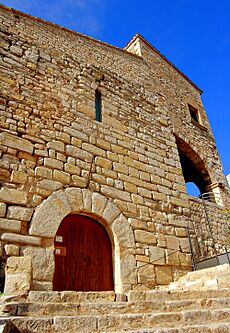Borrell (bishop of Vic) facts for kids
Borrell was an important leader of the church, known as the bishop of Vic, from the year 1010 to 1017. He became bishop after the previous one, Arnulf, passed away. Borrell's time as bishop happened during a period when new towns and settlements were being built in western Catalonia. This was a time of growth and change for the region.
Contents
Who Was Bishop Borrell?
Borrell took on the role of bishop in 1010. One of his first actions was to confirm that certain payments, called tithes, from a fortified town named Gurb belonged to its local lord, Berenguer. These tithes were like a tax, often a tenth of someone's income or produce, paid to the church. Berenguer was also a special priest, a canon, at the main church in Vic.
A Big Disagreement Over Tithes
In 1014, Berenguer became the bishop of Elne, another important church leader. This led to a major problem between the church leaders of Vic and Elne. Bishop Borrell tried to collect the tithes from Gurb himself. He even took property from Berenguer's family.
To try and win this argument, Borrell created fake documents. He made it look like these documents were from an earlier bishop, Froia. In 1017, he showed these fake papers to a meeting of bishops in Narbonne. The council believed the fake documents. They decided that the tithes of Gurb belonged to the church in Vic. They also punished Berenguer.
Borrell's Work and New Forts
Borrell was also involved in legal cases. In 1011 and 1017, he helped decide arguments against the monastery of Sant Cugat.
In 1015, Borrell arranged for a man named Guillem de Mediona to settle in a place called Calaf. Guillem was already in charge of a fort nearby. Borrell told him he needed to build a new fortress in Calaf. Calaf had originally been given to a local leader, but Borrell had managed to get it for the church.
A few months later, Borrell also planned to build a castle at Serra del Riquer. However, there are no records showing that this castle was ever built.
During Borrell's time as bishop, the church gained four new castles. The castle of Vilagelans was given to the church in a will. L'Espelt was a gift. The castles of Santa Perpètua and Barberà were bought by the church.
The End of Borrell's Time
Borrell passed away in 1018. He was returning from a trip to a place called al-Andalus when he died. After his death, a new bishop named Oliba took over. Oliba believed that the documents Borrell used in the Gurb case were fake. So, Oliba changed Borrell's decision about the tithes, making things right again.


